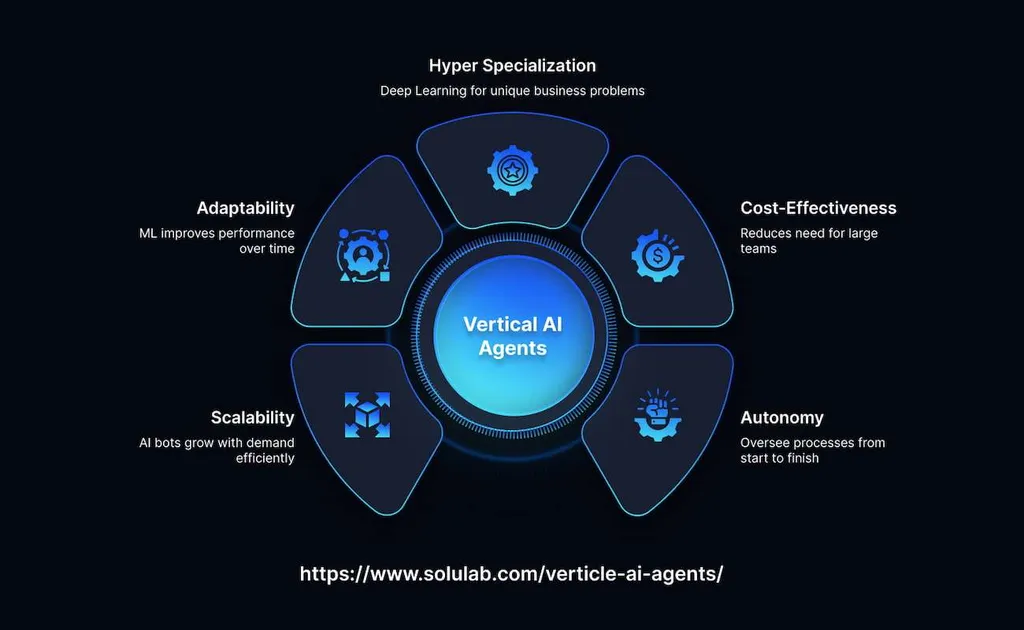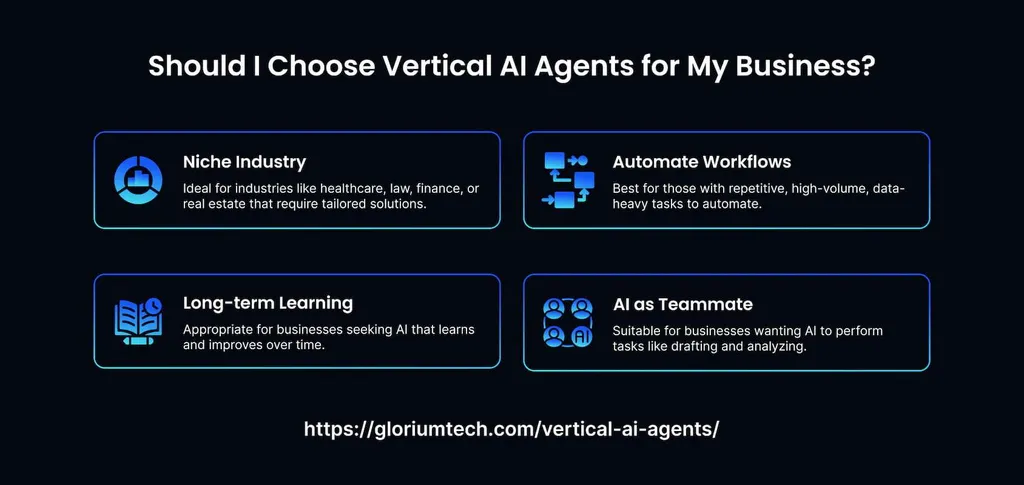Businesses of all sizes increasingly rely on custom Large Language Models (LLMs) to process large volumes of data, answer customer queries in human language, and automate workflows. Unlike simple AI bots, complex systems are trained to provide context-relevant interpretations. Companies personalize such solutions depending on their unique needs to achieve higher efficiency. The introduction of a vertical AI agent designed to solve specific tasks enables ventures to save resources and simplify their routines. Industry experts already predict that such solutions will fully replace Software-as-a-Service (SaaS) platforms. In this guide, we consider the reasons behind the popularity of custom AI tools and examine their potential areas of application.
What are Vertical AI Agents?

The term refers to dedicated AI systems built to perform a narrow scope of tasks or simplify specific workflows. It was coined to describe the recent developments in AI technology that facilitate building top-quality software. Unlike general-purpose LLMs, a vertical LLM is created to handle a set of specific issues. Many businesses already consider them more advanced than SaaS.
The introduction of cloud-based software helped enterprises to spend less money on infrastructure and focus on scalability. SaaS owes its popularity to the release of AJAX, especially the XML HTTP request. This innovative technology enabled the browser to handle convoluted issues. Before this, it had been possible to solve such tasks only in dedicated desktop software.
The transition to vertical AI agents signifies a similar shift. It has fully transformed the industry’s rules. While SaaS allowed companies to access the software they needed with limited investments, vertical AI may enable them to make enterprise chatbots even more powerful and train them to solve particular business issues effectively.
Why is Vertical AI Important?

This technology facilitates using AI to handle routine tasks with higher efficiency. A narrow scope of operations allows AI to achieve the following:
- Solve convoluted tasks. Bots handle top-grade issues that, until recently, required human involvement. Generic models are incapable of successfully dealing with similar problems, as their accuracy is considerably lower.
- Boost productivity. New solutions let businesses significantly simplify business operations and achieve a higher level of task automation. It allows them to tailor their systems to the needs of their particular environments and make them relevant to the industry. The targeted approach facilitates achieving impressive productivity and optimizing processes.
- Gain a cutting edge. Businesses access complex solutions built specifically to deal with complex problems. They have advanced decision-making capabilities and can be applied in different contexts. If companies supply AI agents with high-quality data and build applications that integrate with current workflows, such solutions can significantly simplify business processes.
The impact of AI agents goes beyond these immediate benefits. They are destined to fully transform the situation in the market. Some experts go as far as to predict that these tools may expedite the creation of enterprises worth more than $300 billion. According to some estimations, they can potentially become 10 times larger than modern SaaS businesses and make them obsolete.
The secret to the success of custom AI solutions lies in their ability to replace even the most advanced software. Ventures won’t need to bloat their staff and hire large teams. It will enable them to allocate resources to where they need them most, reduce labor costs, and augment productivity. Enterprises already deploy new methods to build AI-powered suites with narrowly-focused tools. They can quickly outpace modern SaaS giants and offer more convenient solutions to their clients. AI assistants may help businesses achieve unprecedented scalability.
Adjusting the Performance of Vertical AI Agents
Even though these systems are customized from the beginning, they may still require some fine-tuning in the process. When building such solutions, developers customize them depending on the industry’s needs and market situation. Those who manage to configure the performance of their AI systems and make them an integral part of their workflows are expected to become the leaders of their niches.
Successful fine-tuning depends on a firm’s capacity to collect relevant data from reputable sources and structure it to ensure its higher quality. Businesses see data as one of the most important resources. They must prioritize creating private datasets to help their digital assistants acquire extensive expertise in a certain field.
Main Features of Vertical AI
Applications tailored for certain industries are best suited for complex use cases. They are different from horizontal AI platforms built for many applications. New AI tools solve certain issues and simplify processes within specific routines. Here are their main components:
- In-depth knowledge. Vertical AI relies on extensive, industry-relevant expertise. Their main purpose is to create tools capable of grasping the subtle meanings of specific issues in relevant contexts. AI assistants can analyze buyer behavior patterns, perform tasks while staying regulatory compliant, schedule maintenance sessions to ensure uninterrupted manufacturing processes, and take the necessary steps to prevent fraud.
- Customization. Vertical AI models are typically built for a specific purpose. Further fine-tuning increases their accuracy and the relevance of their replies. They analyze and use specific datasets to provide comprehensive responses.
- Data optimization. The usage of well-organized third-party data allows businesses to enhance the accuracy of the responses generated by AI bots. Integration with domain-specific knowledge enables such tools to understand complex processes in niche industries and meet regulatory standards.
- Focus on certain tasks. Industry-specific AI products are tailored to perform well in particular contexts. They often have a well-defined purpose, which explains their extensive application in healthcare and legal practice.
Enterprises integrate domain-specific agents with legacy systems to improve routines and avoid potential disruptions. Task automation allows companies to optimize repetitive operations and avoid hiring large teams. AI solutions have impressive scalability. They help companies grow without expanding their staff.
Can Vertical AI Agents Replace SaaS?
Agentic AI tools are invaluable for ventures from industries where accuracy is the top priority. They are used to simplify specific workflows, such as payroll management, medical billing, or customer support. SaaS owes its popularity to the ability of this model to make software scalable and accessible. Salesforce was the first to release a cloud-based product to replace on-premises systems. In turn, vertical AI agents make SaaS outdated and automate processes using algorithmic solutions.
Here are the main reasons why the vertical AI revolution can be even more disruptive than the transformations introduced by SaaS:
- Reduced payroll expenses. Firms spend more on new software than on expanding their staff.
- Enhanced efficiency. Digital agents can replace the whole team and deliver consistent results of high quality.
Domain-specific bots have already been implemented in several industries. When such solutions become more affordable, it will expedite the adoption.
When used in customer support (CS) systems, vertical AI products replace large teams and reduce average response times. In the QA sector, they eliminate manual testing and expedite development cycles. In HR, AI bots automate technical screenings. Banks already use AI to make debt collection calls more result-yielding. In healthcare, AI will expedite medical billing and claims processing.
Algorithm-based apps seamlessly integrate with current systems and processes. They are easy to deploy and adopt, which allows them to start producing value almost immediately. Verticalized AI apps simplify supply chains, fraud detection, and IT service improvement. Companies deploy them to gain an edge over competitors and uncover helpful insights to make better decisions. AI tools help ventures reduce spending, increase productivity, and maintain consistently high quality even when they scale up processes.
Final Thoughts
As AI keeps evolving, AI apps will bring even higher ROI. The release of the newest version of foundation models will contribute to increased efficiency of agentic AI. The market will become even more competitive, which will result in new integrations. As a result, human-machine collaboration will be more efficient.
A sophisticated vertical AI agent can significantly improve its performance using a custom LLM. It can help a venture unlock new levels of scalability and efficiency. From CS to the healthcare sector, these unique solutions simplify traditional processes and transform the way companies function. MetaDialog develops enterprise-level LLMs designed in accordance with a client’s needs. These solutions allow firms to automate up to 81% of replies and reduce the average resolution time to 20 seconds. Get in touch with our team and discover how to build and deploy powerful AI systems that scale operations depending on current demand.
